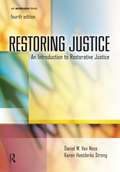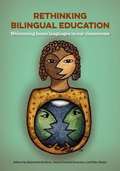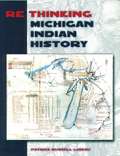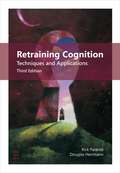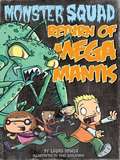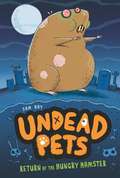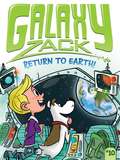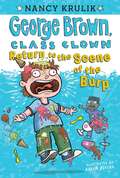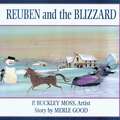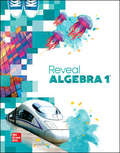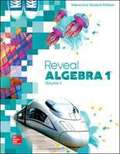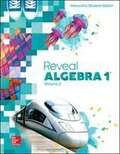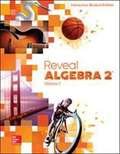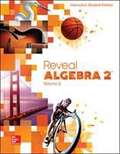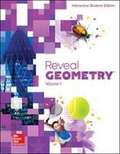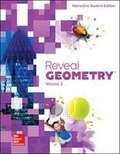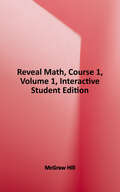- Table View
- List View
Restoring Justice: An Introduction to Restorative Justice (4th Edition)
by Daniel W. Van Ness Karen Heetderks StrongThe book presents a theoretical foundation for the principles and values of restorative justice and develops its four cornerpost ideas of encounter, amends, inclusion and reintegration. It explores the broad appeal of this new vision and offers a brief history of its development. After exploring how restorative justice ideas and values may be integrated into policy and practice, it presents a series of key issues commonly raised on restorative justice, summarizing various perspectives on each.
Retailing Management
by Dhruv Grewal Michael Levy Barton A. WeitzLevy Retailing Management focuses on the broad spectrum of Canadian and international retailers, both large and small, that sell merchandise or services. The text uniquely examines key strategic issues with an emphasis on the financial considerations and store management issues that are particular to the Canadian experience. The Fourth Canadian Edition includes substantial new content on social media and mobile marketing to the multichannel discussion, a more in-depth treatment of the impact of technology on the retail communications mix, and a new chapter dedicated to information systems and supply chain management. As with previous editions, Retailing Management reflects the evolving nature of retailing, including up-to-date data, current and Canadian examples, and cutting edge information on trends in retailing.
Reteaching and Practice Workbook (Grade #1)
by Pearson EducationOffers math practice lessons to improve on what students have already learned.
Rethinking Bilingual Education: Welcoming Home Languages In Our Classrooms
by Elizabeth Barbian"The articles in Rethinking Bilingual Education show the many ways that teachers bring students’ home languages into their classroom—from powerful examples of social justice curriculum taught by bilingual teachers to ideas and strategies for how to honor students’ languages in schools with no bilingual program. We see bilingual educators work to keep equity at the center and to build solidarity among diverse communities. Teachers and students speak to the tragedy of language loss but also about the inspiring work to revitalize languages on the brink of disappearance and to defend and expand bilingual education programs"--Publisher's website.
Rethinking Michigan Indian History
by Patrick Russell LebeauRethinking Michigan Indian History is a teaching tool that honors the Chippewa, Ottawa, and Potawatomi and the twelve federally recognized tribes of Michigan by recognizing their role and place in Michigan history-- exploring what most people know (or do not know) about them. Each lesson includes a background narrative, a set of hands-on, tactile activities, and provides easily understood and visual resources. Rethinking Michigan Indian History explores large issues of Indian stereotypes, the narrow focus on "great" Indian men, the lack of knowledge about treaties and treaty rights, and the role of maps to mislead or distort thinking about how history unfolds and the complexities of land ownership. The lesson exploring Indian stereotypes identifies their existence not only in U.S. consumer culture but also in K-12 classrooms. The goal, however, is not to rebuke the consumer for having bought Big Chief Sugar or the teacher for having young students construct one-dimensional canoes, paddles and Indians out of paper and glue but to use those activities as a demonstration of what most people know about Indians. From this point, a foundation of facts can begin to replace stereotypes in the learning process. Demonstrating further how popular influences can control knowledge, the lesson on "great" Indian men shows how the popular preference for biographies of famous Indian warriors, like Pontiac and Tecumseh or individual women, like Pocahontas and Sacagawea, narrows an understanding of Indians to symbolic representations and issues and ignores their ongoing culture. The lesson on Indian treaties and maps explains and visually shows the reason the Chippewa, Ottawa, and Potawatomi lived in Michigan in 1760 and live in Michigan today in roughly the same places. Treaties are explored in a manner understandable to fourth graders through adults.
Retraining Cognition: Techniques and Applications (Third Edition)
by Rick Parenté Douglas J. HerrmannTextbook on cognitive rehabilitation therapy, for psychology and rehabilitation students. Discusses therapeutic methods and their theoretical foundations in cognitive psychology, neuropsychology, and speech.
Retrieving the American Past
by David McdanielA reader of documents and articles about American history from the voyages of Christopher Columbus to the present day.
Return of Mega Mantis #2
by Laura DowerThe Monster Squad is back and this time they are battling one of Leery's biggest creations-Mega Mantis. The giant mantis has returned to Riddle and he brought all of his insect friends with him. Now it's up to the Monster Squad to squash this bug for good! But how do you kill a bug that's four times bigger than a house?
Return of the Hungry Hamster #1
by Simon Cooper Sam HayDumpling the hamster came to a dusty end inside a vacuum cleaner. He suspects that his owner Oliver's parents never admitted to their son that they were to blame for Dumpling's demise. Now the hamster needs Joe's help to reveal the truth - but there's a furry surprise awaiting them at Oliver's house...
Return to Earth!
by Ray O'Ryan Jason KraftZack is a planet-hopping pro--but a return to Earth results in some unexpected puppy trouble in the tenth Galaxy Zack chapter book adventure.Zack is headed back to Earth for the first time since moving to Nebulon. He can't wait to see his best friend Bert and show his new friend, the former bully Seth Stevens, all around his old stomping grounds! Luna's excited too. A little too excited. When the pooch escapes and goes missing, sightseeing plans take an unexpected turn. Will Zack find Luna before he has to head home to Nebulon? With easy-to-read language and illustrations on almost every page, the Galaxy Zack chapter books are perfect for beginning readers.
Return to the Scene of the Burp #19
by Nancy Krulik Aaron BlechaI scream, you scream, we all scream—for the super burp!George is determined to find a cure for his bothersome burps, so he returns to the place where it all began—Ernie's Ice Cream Emporium—to find a secret ingredient. But when a competing ice cream shop opens right across the street, George worries it will put Ernie's out of business and he'll be stuck with the burp forever. Can George squelch the belch once and for all?
Reuben and the Blizzard
by Merle GoodWhen the biggest blizzard in years sweeps across their farm, Reuben and his five sisters, his parents, and his grandfather all face new adventures and challenges. But the loss of electricity doesn’t affect his family since they never had any. And when their neighbor man can’t get his car out to take his wife to the hospital, Reuben and his father come to the rescue with their sleigh. This revised edition features updated text and newly designed pages.Sky Pony Press, with our Good Books, Racehorse and Arcade imprints, is proud to publish a broad range of books for young readers-picture books for small children, chapter books, books for middle grade readers, and novels for young adults. Our list includes bestsellers for children who love to play Minecraft; stories told with LEGO bricks; books that teach lessons about tolerance, patience, and the environment, and much more. While not every title we publish becomes a New York Times bestseller or a national bestseller, we are committed to books on subjects that are sometimes overlooked and to authors whose work might not otherwise find a home.
Reveal ALGEBRA 1®
by McGraw-HillThis is a blended print and digital program that supports access on the go. The Users can use the student edition as a reference as they work through assignments in the Student Digital Center, access interactive content, animations, videos, eTools, and technology-enhanced practice questions.
Reveal Algebra 2, Volume 1
by McGraw-Hill Education Firm StaffNIMAC-sourced textbook. Students explore, collaborate, and reflect to build confidence in their Algebra 2 math abilities using this volume 1 of 2 interactive student write-in text.
Reveal Algebra 2, Volume 2
by McGraw-Hill Education Firm StaffHigh school algebra, grades 9-12. NIMAC-sourced textbook
Reveal Geometry™, Volume 2
by McGraw HillStudents explore, collaborate, and reflect to build confidence in their Geometry math abilities using this volume 2 of 2 interactive student write-in text.

